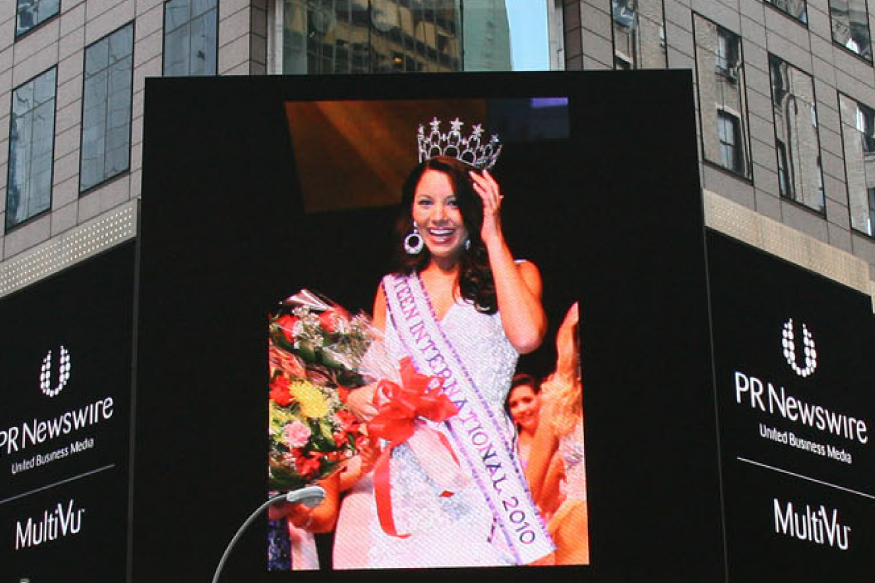Helping Hearts In America
February 17, 2011

Miss Teen International and UMD Communication major Juliana McKee weighs in on American Heart Month.By Katelin Wangberg
Miss Teen International and UMD Communication major Juliana McKee weighs in on American Heart Month.By Katelin Wangberg February is the month to wear your heart on your sleeve, or at least keep heart health on your mind. With an average of 2,200 Americans dying of heart disease each day, one death every 39 seconds, heart health is more important than ever. It’s American Heart Month and Miss Teen International 2010 and UMD Department of Communication sophomore Juliana McKee talks about her work to promote heart health.
Q: What inspired you to promote healthy hearts? Juliana McKee: Losing my 12-year-old cousin, Erick, to congenital heart disease about two and a half years ago was a huge wake up call for me. It made me realize how lucky I was to have been born with a healthy heart when so many people, like my cousin, are born with unhealthy hearts. It was then that I decided that I wanted to share with others who were born with healthy hearts how lucky they are to have the opportunity to make the choice to live a healthy lifestyle and, in doing so, take care of their heart and keep it healthy for decades to come. Q: Why is heart disease an important issue in this day and age? Juliana McKee: Heart disease isn't just an important issue, it is the important issue in this day and age, as it is now the #1 killer of both men and women in the United States of America. I believe that one of the biggest reasons heart disease is such a huge problem in our country is because of a lack of education or poor education about what heart disease actually is. Until I began working with the American Heart Association (AHA) a few years ago, I thought heart disease was just a fancy way to say "heart attack", however, I now know that the term "heart disease" is an umbrella phrase that includes a vast number of both genetic and acquired conditions and factors that can affect anyone regardless of age, race, or gender. When I ask many people what their mental image of heart disease is, if they had to personify it or put a face on it, most people say that they envision an old man with a "beer belly" grabbing his chest and asking for an aspirin. This is the misconception that we must change in order to stop our nation's number one killer from continuing to claim victims. Q: What do you do to help promote healthy hearts? Juliana McKee: I present at speaking engagements at venues such as recreation centers, boys and girls clubs, schools, hospitals, clinics, and theaters. At these engagements I share my cousin Erick's story and how losing him affected me and changed my view of my health and my lifestyle. I also speak on my own challenges to achieve and maintain a healthy lifestyle, especially the challenge I faced last fall semester when inactivity due to a broken foot and a poor diet caused me to gain, not the "freshman 15", but the freshman 30 if there is such a thing. I share with them how difficult it was for me to motivate myself to eat healthy, especially in college, and exercise regularly, but I also show them the tremendous positive impact that those changes have had on my life. Q: How has winning Miss Teen International helped your cause? Juliana McKee: Regardless of whether or not I held a title I do believe I would still be working to promote the importance of heart health, especially to young people. However, being a titleholder has dramatically benefited my efforts. My crown and sash are like a megaphone, with which I am able to grab and hold the attention of children, teens, and adults alike, many of whom I probably wouldn't be able to effectively reach out to otherwise. With so much going on, both domestically and internationally, it is so easy for people to forget about what is "right under their own nose", their own health. I am here to remind them that their health is just as important and relevant, if not more important and relevant than the headlines on the newspaper. Q: What advice would you give students who have causes they want to promote? Juliana McKee: My advice is, first and foremost, be persistent. Never take "no" for an answer when it comes to something that you are passionate about, especially when it has the potential to benefit others. Often, young people aren't taken seriously, especially when it comes to promoting a cause that is bigger than themselves. I believe this is simply because young adults stereotypically can't see outside their own little "bubble" – that is many older adults believe that young adults and adolescents only care about things that directly affect them in some way. Because of this, I've found that sometimes adults don't take me seriously at first when I talk to them about heart health or the AHA. I believe that the best way to overcome this stereotype is to be persistent and force others to realize that you are passionate about your cause and that you are going to get things done and make a difference outside your "bubble."

